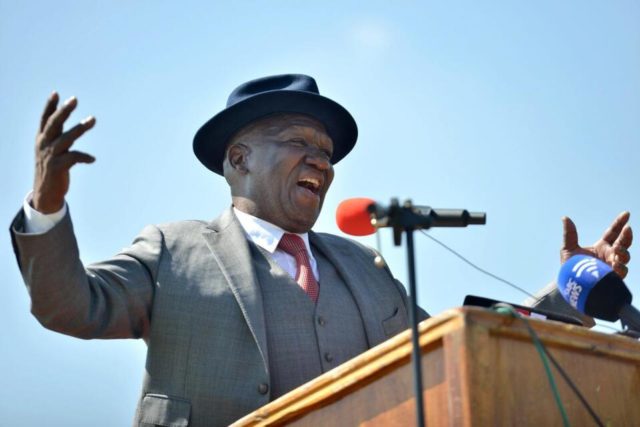The police minister said it is was important that police fight the scourge of GBV internally and externally.
POLICE Minister Bheki Cele has pleaded with SAPS members to serve communities well and fight the scourge of gender-based violence.
Cele was addressing the Police and Prisons Civil Rights Union (Popcru)’s central executive committee meeting taking place on Thursday and Friday in Ekurhuleni.
Popcru president Zizamele Cebekhulu called for a single cluster of the criminal justice department.
Cebekhulu said that a lot of police members had been killed in the line of duty and Popcru wondered what their managers were doing.
He said a plan was needed to defend workers on the ground, and although they had looked through the strategic direction, the strategic document of the SAPS, it was not reflected in that.
“That means this thing (police killing) is not important to the SAPS management. We can’t leave this one. We can’t … (not to the) point where police are being killed and your managers at head office have the luxury of fighting each other or getting rid of each other.
“We are calling on you, minister and the president of the country, to intervene. Those managers are playing with our lives. We find police stations without resources. We find officers having no uniform. We find police stations being robbed. Nobody worries about us. We die alone on the ground.
“We are calling … (for) a serious and an immediate dialogue about this matter. We can’t die in vain and our families left unattended,” Cebekhulu said.
Cele said not all the relevant role-players were in attendance, adding that Cebekhulu should have invited everyone concerned.
He agreed that dialogue was needed.
“Your call to the president that you have made to have a single kind of justice house, maybe is what you have not been very clear (about) as a cluster, I fully agree with you. I meet so many frustrated police, frustrated by another segment of the justice cluster, that would be prosecution. That is why I am saying not all of us are here. I would not go for prosecution here until there is a dialogue and we are all seated,” said Cele.
He said bail was problematic.
“This is an animal we don’t know what to do about. Four weeks ago I attended the burial of an officer in Sebokeng, who died in an exchange of fire with criminals that were found preparing for a cash heist. Due to an exchange of fire, one of our officers was killed, two criminals were also killed, and we arrested 19 of them at a go.”
One of them had received bail six times in cases involving cash heists and murder against him.
“I would think that a second bail of a murderer can’t be granted. Police have to chase after a person who has been given six bails for a schedule six crime. We have to sit down and talk about those things and understand.”
Cele said there were long lists of serious crimes such as murder, rape, cash heists and house robberies that were committed by people who were on bail. He said the police had to chase them again. There was also a long list of parolees committing crime.
The minister said that at a certain point, police had to be defended in such a way that they did not die in the line of duty.
“Too many police officers die in the line of duty, too many are killed in a place where they are supposed to be safe, where they are not in the line of duty. But there is one thing that is creeping in and creeping in at the police service, and creeping fast, the gender-based violence of the members of the SAPS themselves,” he said.
Cele said that even male SAPS members did not protect women.
He said it is was important that police fight the scourge of GBV internally and externally.
Regarding the backlash police were receiving about the DNA backlog, Cele said: “In the financial year of 2016/17, nationally, there was only a backlog of 600. In 2017/18 the backlog was 1,000, in 2018/19 it was 50,,000.
“In May this year, we sat down and worked on the turnaround of these things. That time, it was 210 000 … and, last week, the backlog is now 240,000. Remember, most of this is what is supposed to resolve cases of GBV and murder.”
– Political Bureau








